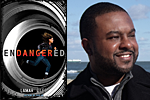Chris Baty's Blog, page 167
April 10, 2015
Camp Pep: You Are Full of Wonder

Are you tackling a writing project this April at Camp NaNoWriMo? Our incredible participants have words of wisdom to share with their fellow writers. Today, Rase challenges you to embrace wonder:
Dear Wrimos,
As infants, we’re filled with wonder. A curly lock of hair, babbled sounds tripping off a wagging tongue, peekaboo—all of it is awesome.
Then we grow up. Inevitably and all too soon, life is just mundane. Most people are lucky to not grow bored of the world, let alone become cynical or alienated.
But that’s not you. As readers, artists, creators, and dreamers there’s still hope you will be ambassadors for wonder as a narrative force, making it not only a reason why you write, but also a technique for how you write…
Wonder’s haughty sibling, “conflict,” usually gets the acclaim, with many writers insisting that conflict is the essential ingredient to an engaging story. But consider the magical school. Whether Hogwarts or Brakebills, in the city of Ankh-Morpork or on the island of Roke, the magical school is narrative wonder writ large. We chuckle when the Weasley twins sprout beards after cheating the Goblet of Fire’s age line; we long for a Marauder’s Map that can lead us toward butterbeer.
Or leave school and head to the circus, specifically to Erin Morgenstern’s wonder-filled The Night Circus. Morgenstern, a proud NaNoWriMo winner, once grew so bored with her NaNo project that she sent all her characters to the circus. And what a circus it became! We shiver in her garden of ice, navigate the maze she made from clouds, and discover hope sitting beneath her Wishing Tree.
My point is that wonder is the fun stuff, the stuff written because why shouldn’t it be written? In fact, wonder often infuses the moments remembered most fondly, regardless of genre—it’s Hazel and Gus drinking champagne at Oranjee, Wall-E and EVE dancing through space. I write to give readers the wonder I experienced in these scenes—which I hope you’ll do too.
Acts of wonder will boost your Camp NaNoWriMo project to the finish line. Aiming for wonder is a free pass to imagine the coolest thing possible without worrying if it fits your narrative. Readers can love fanciful flights and “unnecessary” tangents; I urge you to write whatever comes alive on the page. And in a delightful twist, creating wonder turns out to be fun.
So, I hope that starting today we will open our eyes and smile wide. Let your excitement stream out onto the page. Write what makes you happiest, because joy—like wonder and creativity—is contagious.

Rase McCray aspires to be a househusband and full-time wonderer. When not drafting and revising his first adult novel about the hopes and dreams of famous dolls, he writes professionally about science, reads feminist novels, and theorizes about craft in all narrative forms, from recipe card to torch song. His 140-character passions are mostly unedited on Twitter, and he is steadily improving his bookternet game.
Top photo by Flickr user Tony Fisher Photography.
April 9, 2015
"If you’re having trouble with a scene or a story arc, sometimes it helps to get inside your..."
Ask them all kinds of questions: goals, ambitions, childhood memories, favorite foods, celebrity crushes. And if you’re having trouble figuring out how two characters mesh, have them interview each other. It’ll definitely give you some new perspective on your story and the people in it.”
-
Sona Charaipotra is a journalist, and received her MFA in Writing for Children. She is the co-founder of CAKE Literary, a boutique book development company with a decidedly diverse bent. Her first novel, Tiny Pretty Things (with co-author Dhonielle Clayton), hits shelves May 26, 2015.
Writer’s Care Packages from Camp NaNoWriMo and We Need Diverse Books.
April 7, 2015
"Most of us have hectic schedules—squeezing your daily word count into that mess can seem like an..."
Most of us have hectic schedules—squeezing your daily word count into that mess can seem like an impossible task. One way to get it done: streamline and schedule. Think about when you have the most brainpower. But also figure out what you can actually make time for.
For some people, this means a 5 a.m. sprint every morning without fail. For others, it’s tucking into that manuscript late at night, when the rest of the day’s commitments are met. Figure out when you can commit—even 20 minutes is better than zero, right?—and slot that time onto your calendar. Then stick with it.
”-
Sona Charaipotra is a journalist, and received her MFA in Writing for Children. She is the co-founder of CAKE Literary, a boutique book development company with a decidedly diverse bent. Her first novel, Tiny Pretty Things (with co-author Dhonielle Clayton), hits shelves May 26, 2015.
Writer’s Care Packages from Camp NaNoWriMo and We Need Diverse Books.
April 6, 2015
"If you’ve been working steadily, by the time you’re heading into the thick of your draft, you might..."
If you’re not a plotter, this might be just the right time to live a little and try your hand at an outline anyway. Knowing the basics about your story could mean the difference between finishing a draft and letting it languish in perpetuity. And it doesn’t have to be a scene-by-scene roadmap.
Start simple, with one paragraph each for beginning, middle and end. Then break down those three sections into smaller chunks, and you’ll start to see chapters fall into place, seemingly with a will of their own!”
-
Sona Charaipotra is a journalist, and received her MFA in Writing for Children. She is the co-founder of CAKE Literary, a boutique book development company with a decidedly diverse bent. Her first novel, Tiny Pretty Things (with co-author Dhonielle Clayton), hits shelves May 26, 2015.
Writer’s Care Packages from Camp NaNoWriMo and We Need Diverse Books.
April 3, 2015
Camp Pep Talk: How to Feed and Water Your Story Seed

Are you tackling a writing project this April at Camp NaNoWriMo? Our incredible participants have words of wisdom to share with their fellow writers. Today, Elizabeth shares how to grow your story seed into something beautiful:
Spring has come at last to the northern hemisphere, so let me rave to you about gardening. The idea you are working on now is a seed. It may be quite small but it contains the glittering story you have always dreamed of writing.
Yet it will not grow without the proper care.
This precious seed will only grow into a dazzling tale if you first heap upon it a nourishing bed of rich, fecund … word compost. That’s right, word compost. Your story requires you to shovel lots and lots of words onto it, or it will not sprout…
Five thousand words? Ten thousand? 50,000? Whatever your goal, you’ve got to pile up those words. Do not stop until the bed is complete, or a beautiful thing will wither there, lost to the world.
As you add more and more words to your garden bed, you might wonder: is this really going to work? These loads of words are heavy, and they stink! Maybe my seed is a dud, and it will never grow. Maybe a squirrel ate the plot when I wasn’t looking. Maybe it’s nothing but weeds!
Trust me: your story is buried in there somewhere. The word compost is supposed to smell a little bit. It may even contain half-rotten fragments of other stories, which your mind has not finished decomposing. That’s normal. Keep typing, scribbling, or dictating, no matter what.
Be patient if your story is slow to germinate. If you don’t see progress at first, do not assume your seed is a dud and throw out the whole bed. You’ll kill whatever was in there. Just keep going.
When the first tentative story sprouts appear in your garden, do not assume they are weeds and rip them out, no matter how stunted or odd they look. Some of them might be the real thing. You just have to wait until they get bigger to tell for sure.
And if you’re raising a brand new seedling this month, please keep those editorial pruning shears away from the poor thing. Let it grow strong before you start styling the branches, or hacking away with cuts and critiques.
The story you get in the end may not look like what you expected. Don’t be surprised if it doesn’t look like the picture on the packet. Mix-ups happen, because seeds all look kind of the same. But this one is special, because only you can make it grow.
Keep writing. Keep composting. Happy spring.

Elizabeth Heller is 29 and lives in Seattle. She loves stories in all their forms, especially history, photography, cooking, and the natural world. She once passed a medieval history course by writing a crossover of Batman, Dante’s Inferno, and Chaucer’s Canterbury Tales, with proper citations. She hopes someday to own a beehive. Her houseplants desperately need larger pots.
Top photo by Flickr user Jackal of all Trades.
"It can be hard to get into the groove once you sit down to write. One trick that I’ve learned:..."
The prompts can be as simple as “The next day my main character is going to get mad”, or they can be bullet points about descriptions or setting. Then, when you start writing in your next chunk of time, you can read the last page to get your writing voice in your head, and go straight into your prompt.”
-
I. W. Gregorio is a practicing surgeon by day, masked avenging YA writer by night. After getting her MD, she met the intersex patient who inspired her debut novel, None of the Above.
Writer’s Care Packages from Camp NaNoWriMo and We Need Diverse Books.
April 1, 2015
"Hold yourself accountable. If you’re not the type of person who responds to “rewards” (or if..."
One of my favorite tips is to write a check to an organization you dislike, and send it if you don’t get your work done for the day. It worked for my environmentalist husband—I threatened to send a check to Exxon Mobil, and he got his work done in record time.”
-
I. W. Gregorio is a practicing surgeon by day, masked avenging YA writer by night. After getting her MD, she met the intersex patient who inspired her debut novel, None of the Above.
Writer’s Care Packages from Camp NaNoWriMo and We Need Diverse Books.
March 31, 2015
"There is no single piece of writing advice that is valid for every writer.
There are as many..."
There are as many different ways of writing as there are people on this earth, and if anyone ever tells you that you “have to do this”; or you “should do this”; sometimes the easiest thing to do is smile, nod, and file the advice away (after liberal salting).
Do what works for you (and feel free to ignore this advice!).”
-
I. W. Gregorio is a practicing surgeon by day, masked avenging YA writer by night. After getting her MD, she met the intersex patient who inspired her debut novel, None of the Above.
Writer’s Care Packages from Camp NaNoWriMo and We Need Diverse Books.
March 30, 2015
Camp NaNoWriMo & We Need Diverse Books Present: Your April 2015 Camp Counselors

Camp NaNoWriMo is nearly here! What is Camp NaNoWriMo? Great question! It’s a virtual writing retreat where you can:
Set your own word-count goal.Tackle any writing project, novel or not.
Join a twelve-person virtual cabin and be a part of a focused writing group.
Every writer needs a mentor, especially when they’re setting out on into the wilderness of their imagination. To help you tame plot bunnies, overcome writer’s block, and track down your characters, we’re partnering with fellow nonprofit We Need Diverse Books.
We Need Diverse Books and Camp NaNoWriMoThis April, WNDB and NaNoWriMo asked four amazing authors to serve as Camp NaNoWriMo’s Camp Counselors: providing mentorship, encouragement, advice, and, sometimes, the occasional comfort after a particularly tough scene. How?
By sending virtual Care Packages through the Camp site’s mail system! We’ll also share those packages here on Tumblr!By hosting a #WNDBNaNo tweet-chat on Wednesday, April 8, at 10 AM PDT!
The Camp Counselors
WNDB and Camp NaNoWriMo are thrilled to introduce you to this April’s Camp Counselors:

I. W. Gregorio is a practicing surgeon by day, masked avenging YA writer by night. After getting her MD, she did her residency at Stanford, where she met the intersex patient who inspired her debut novel, None of the Above (Balzer & Bray / HarperCollins, April 7, 2015). She is a founding member of We Need Diverse Books™ and serves as its VP of Development. A recovering ice hockey player, she lives in Pennsylvania with her husband and two children. Find her on Twitter, Tumblr, Facebook and Instagram at @iwgregorio.

Sona Charaipotra is an entertainment and lifestyle journalist published by the New York Times, People, Parade, ABC News, MSN.com, iVillage.com. Sona received her MFA in Writing for Children from the New School. Thanks to a Masters in screenwriting from New York University (where her thesis project was developed for the screen by MTV Films), Sona is a strong believer that three-act structure can work in fiction, too. She is the co-founder of CAKE Literary, a boutique book development company with a decidedly diverse bent. Her first novel, Tiny Pretty Things (with co-author Dhonielle Clayton), hits shelves May 26, 2015, via HarperTeen. You can also find her on Twitter: @sona_c.

Olugbemisola Rhuday-Perkovich is the author of 8th Grade Superzero (Arthur A. Levine/Scholastic, 2011), and the forthcoming Two Naomis with Audrey Vernick (Balzer & Bray/HarperCollins, 2016). She contributed to Imagine It Better: Visions of What School Might Be, Break These Rules, and Open Mic: Riffs on Life Between Cultures in Ten Voices. She loves working with schools, libraries, and community organizations as a teaching artist and lifelong learner, and is a member of The Brown Bookshelf and We Need Diverse Books. She lives with her family in NYC where she loves to walk, cook, do crafts in many forms, and needs to get more sleep. Find her at @olugbemisola on Twitter.

Marieke Nijkamp is a storyteller, dreamer, globe-trotter, geek. She is VP of We Need Diverse Books™ and the founder of DiversifYA. This Is Where It Ends, her debut YA, will be released by Sourcebooks Fire. She wants to grow up to be a time traveler.

More than just a hashtag, We Need Diverse Books (WNDB) is a grassroots nonprofit organization created to address the lack of diverse, non-majority narratives in children’s literature. WNDB is committed to the ideal that embracing diversity will lead to acceptance, empathy, and ultimately equality. Its future initiatives include a Diversity in the Classroom program, diverse author grants and awards, and the first ever Diversity Festival in 2016. Volunteer & sign up for its mailing list at diversebooks.org, or follow WNDB on Twitter, Tumblr, Facebook, and Instagram!
March 26, 2015
Choose Your Camp: How to Survive Plot Creation

Camp NaNoWriMo begins in April! In the spirit of friendly camp competition (and inspired by one of our favorite scenes in Scott Westerfeld’s Afterworlds), we asked our friends to Choose Your Camp. Lamar Giles, author of 2015 Edgar Award Nominee Fake ID, and Endangered, explains how to survive Camp Plot:
Hey there, campers! Gather ‘round the fire and admire this view of the stars. I’m Lamar, one of your Camp Plot Counselors and I’m going to walk you through how we do things here in PC. First, one really important housekeeping tip: If you see a big, moldy, zombie-ish dude with a machete and a totally out of place sports mask, you should run. Fast.
Just kidding.
Running won’t matter.
For those of you who stick with the group and don’t wander off into the woods never to be seen or heard from again, you’re going to learn about ways to plot, Camp NaNo style!
For me, plot comes first. Before character—because I get to know my characters as I write. Before setting—because, in a way, I like my setting to be a character I get to know, too. I write fast-paced stuff in a bunch of genres and I’m all about energy. Propulsion. Like those race cars that are part rocket and need a sideways parachute to slow ‘em down so they don’t break the space-time continuum. Except, screw that parachute.
On the subject of plot, John Irving says, “Know the story—as much of the story as you can possibly know, if not the whole story—before you commit yourself to the first paragraph.”
On the flipside, one of my favorite writers that I stalk/admire, Stephen King, believes, “plotting and the spontaneity of real creation aren’t compatible.”
I fall squarely in the middle of those two philosophies. If you’re interested in how that looks, here you go…
Know how to start your storyA loose concept will do. In my new book, Endangered, all I knew was that it started with a character looking at an enemy through a scope like a sniper. As I wrote the scene, I realized it wasn’t really a rifle scope, but a camera lens. And, even though it was a camera, not a gun, an assassination of sorts was still taking place. With much pain and effort, the rest of my photo vigilante thriller unspooled from there.
I rarely know anything about the middle of my books before I get there, but I typically have a rough idea of how I want the story to end—what I want to say. If you can recognize your finish line in the distance, then you can…
Get there in the most twisted way possibleIt doesn’t matter if you start with something as familiar as boy meets girl and end with happily ever after, you can create something fresh, something subversive, something mind blowing by simply going off-road to get from beginning to end.
Ignore the most obvious plot turns—which means you might toss your first, second, and third ideas at every point during the process. If that feels hard—almost impossible—you’re probably doing it right.
Embrace surprisesAs you write that mysterious middle, revelations will come, and those revelations may lead you to alter that starting concept, or go to a different ending. It’s okay. Your story is probably better for it. Remember, screw that parachute.
That’s it for tonight Campers! There’s more, but, remember that machete guy I told you about, and that advice I gave about running?
Well, I see him shambling right behind you. And I’m a lead-by-example kind of counselor. So, I’ll pick this up later with those of you who make it.
Write on!

Lamar Giles writes novels and short stories for teens and adults. He is the author of 2015 Edgar Award Nominee Fake ID, Endangered, and a third, currently untitled YA novel from HarperCollins, as well as the upcoming YA novel Overturned from Scholastic Press. Lamar Giles is a founding member of We Need Diverse Books. He resides in Virginia with his wife. Follow @LRGiles on Twitter.
Top photo background by Flickr user amalakar.
Chris Baty's Blog
- Chris Baty's profile
- 63 followers



